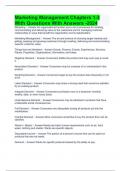Marketing Management Chapters 1-3
With Questions With Answers -2024
Marketing - Answer An organizational function and a set of processes for creating,
communicating and delivering value to the customers and for managing customer
relationships in ways that benefit the organization and its stakeholders.
Marketing Management - Answer The art and science of choosing target markets and
getting, keeping and growing customers through creating, delivering and communicating
superior customer value.
Things that are Marketed - Answer Goods, Persons, Events, Experiences, Services,
Places, Properties, Organizations, Information, and Ideas.
Negative Demand - Answer Consumers dislike the product and may even pay to avoid
it.
Nonexistent Demand - Answer Consumers may be unaware of or uninterested in the
product.
Declining Demand - Answer Consumers begin to buy the product less frequently or not
at all.
Latent Demand - Answer Consumers may share a strong need that cannot be satisfied
by an existing product.
Irregular Demand - Answer Consumers purchases vary on a seasonal, monthly,
weekly, daily, or even hourly basis.
Unwholesome Demand - Answer Consumers may be attracted to products that have
undesirable social consequences.
Full Demand - Answer Consumers are adequately buying all products put into the
marketplace.
Overfull Demand - Answer More consumers would like to buy the product than can be
satisfied.
Wants v. Needs - Answer Needs are basic human requirements such as air, food,
water, clothing and shelter. Wants are specific objects.
Disposable Income - Answer The portion of a person's income that can be spent on
products that are not needs.
Demand - Answer Wants for specific products backed by the ability to pay.
, Value Proposition - Answer a set of benefits that satisfy a consumers needs.
Segmentation - Answer the process of dividing a larger market into smaller pieces
based on one or more meaningfully shared characteristics
Target Markets - Answer The part of the qualified available market the company
decides to pursue
Industry Convergence - Answer a process whereby formerly unrelated industries begin
to satisfy the same customer need
Disintermediation - Answer the elimination of intermediaries such as wholesalers or
distributers from a marketing channel
Marketing Plan - Answer Written document that summarizes what the marketer has
learned about the marketplace, indicates how the firm plans to reach its marketing
objectives and helps direct and coordinate the marketing effort.
Marketing Concept - Answer is to find not the right customers for your products but, the
right products for your customers
Phases of Value Creation and Delivery Process - Answer Choosing the value,
providing the value, and communicating the value.
Customer Relationship Management Process - Answer All the activities in building
deeper understanding, relationships, and offerings individual customers.
Core Competency - Answer attribute that (1) is a source of competitive advantage in
that it makes a significant contribution to perceived customer benefits, (2) has
applications in a wide variety of markets, (3) is difficult for competitors to imitate.
Holistic Marketing - Answer a concept based on the development, design, and
implementation of marketing programs, processes, and activities that recognizes their
breadth and interdependencies.
Levels of Marketing Panning - Answer Planning, Implementing, and Controlling
Tactical Planning - Answer Marketing tactics, including product features, promotion,
merchandising, pricing, sales channels and service.
Strategic Planning - Answer Laying out the target markets and the value proposition
that will be offered, based on analysis of the best market opportunities.
Characteristics of a Good Mission Statement - Answer Focus on a limited number of
goals





